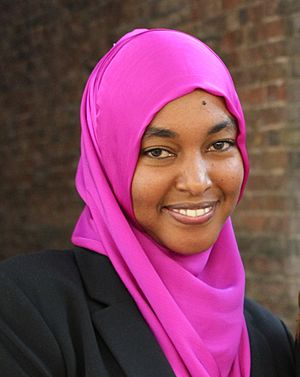Halima Ali Adan facts for kids
Quick facts for kids
Halima Ali Adan
|
|
|---|---|

Halima Adan, 2013
|
|
| Born | 1984 (age 41–42) |
| Nationality | Kenyan |
| Education | University of Greenwich |
| Occupation | Gender rights activist |
| Known for | Advocacy against female ... ... (FGM) |
Halima Ali Adan is a brave Somali activist who works for the rights of girls and women. She is an expert on a harmful practice called female ... ... (FGM). Halima helps lead a group that works against violence, and she manages programs for an organization called Save Somali Women and Children (SSWC). This group is based in Somalia and helps people in need.
Early Life and Education
Halima Adan was born and grew up in Mombasa, Kenya. She moved to London to study at the University of Greenwich. There, she earned a degree in Computer Science.
Later, she got another degree in Development Studies. After finishing her studies, Halima first worked for an internet company in Kenya.
Working for Change
Since 2014, Halima Adan has been a program manager for Save Somali Women and Children (SSWC). She also helps lead the Gender Based Violence (GBV) work group. SSWC was started in 1992 by Somali women in Mogadishu. Their goal was to create a group that would help Somali girls and women. These women often faced unfair treatment, violence, and poverty in their communities.
Facing Challenges
Halima's GBV team has faced many difficulties while trying to help victims of violence in Somalia. There are not enough police officers trained to handle these cases. Also, there are very few female police officers. Many victims do not trust the justice system. They also fear that the people who harmed them might get revenge. Because of these reasons, many victims do not report the crimes.
Getting Support
In 2014, the UK government started helping Somali humanitarian groups. They gave money to SSWC and other organizations in South-Central Somalia. This funding was part of a larger effort to prevent violence across Somalia. The money first helped provide basic services for victims. These projects focused on training health workers and offering support. They also provided legal and financial help. The groups also worked to raise awareness through education.
In 2015, the United Nations Population Fund (UNFPA) and a U.S. aid office (OFDA/USAID) also provided more funding. This international support has allowed Halima and her team to grow their programs. They now work with other GBV groups in Somalia. They also provide more training for GBV coordinators in different regions of Somalia.

